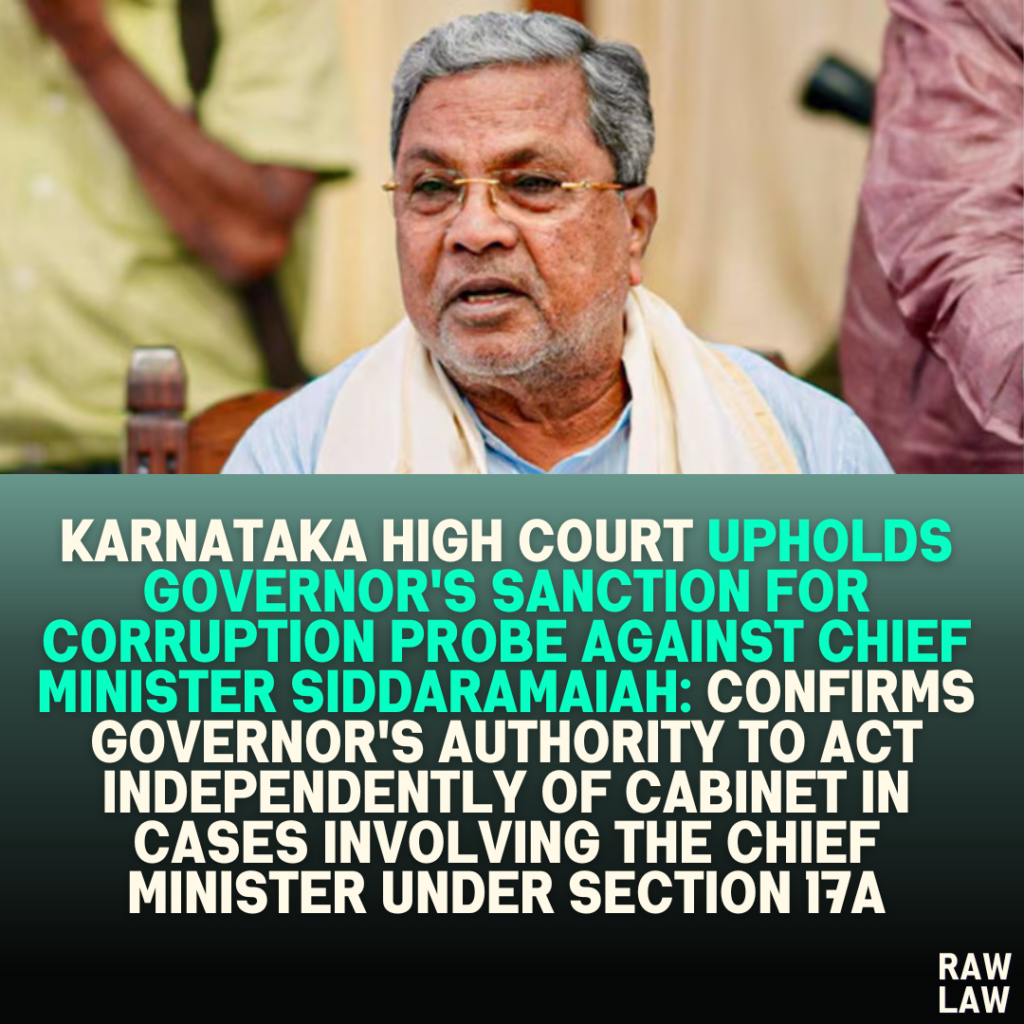Court’s Decision:
The court denied the writ petition and upheld the order of the Governor of Karnataka granting sanction for prosecution under Section 17A of the Prevention of Corruption Act, 1988, and Section 218 of the Bharatiya Nagarik Suraksha Sanhita, 2023. The court concluded that the Governor’s decision was taken after due application of mind, and the petitioner’s objections were not enough to invalidate the sanction granted.
Facts:
The petitioner, a prominent political figure, challenged the Governor’s order granting sanction for prosecution. The allegations centered around the petitioner’s involvement in illegal land transactions and undue enrichment through fraudulent land acquisitions and compensatory land grants to family members. These transactions allegedly caused a significant loss to the state exchequer.
The complainants had initially attempted to file complaints before the jurisdictional police, but when no action was taken, they approached the Governor for sanction to prosecute under the Prevention of Corruption Act and other applicable provisions. The Governor, after receiving the petition, sought responses from the petitioner and the Cabinet and eventually granted sanction, which led to the filing of this writ petition.
Issues:
- Whether the Governor’s order granting sanction for prosecution was legal and valid.
- Whether the Governor applied his mind to the materials before granting sanction.
- Whether the petitioner’s alleged involvement in the illegal transactions warranted the grant of sanction for prosecution.
Petitioner’s Arguments:
The petitioner contended that the Governor’s order was issued without proper application of mind and was in violation of the principles of natural justice. The petitioner argued that the Governor failed to consider the petitioner’s response and the Cabinet’s advice properly. It was also submitted that the petitioner had no direct involvement in the transactions in question and that the entire case was politically motivated, aimed at destabilizing the elected government.
Further, the petitioner argued that the Governor’s reliance on certain judgments was misplaced, as subsequent rulings had distinguished them. Additionally, the petitioner contended that the Governor had no material evidence of the petitioner’s involvement in any corrupt activities, as the transactions were carried out by other individuals.
Respondent’s Arguments:
The respondents, represented by the Solicitor General, defended the Governor’s order, arguing that the Governor had exercised his constitutional authority with due diligence. They contended that the Governor’s order need not be as detailed as a judicial order and that the materials on record, including the petition and documents, were thoroughly reviewed.
The respondents argued that the petitioner’s role in the illegal transactions could only be fully investigated following the sanction and that the petitioner’s objections were premature. Furthermore, the respondents pointed out the seriousness of the allegations and the need for a thorough investigation to ascertain the petitioner’s role, if any, in the alleged fraud.
Analysis of the Law:
The court examined the legal principles surrounding the Governor’s power to grant sanction for prosecution under Section 17A of the Prevention of Corruption Act. It was held that while the Governor is required to consult the Cabinet, in cases involving the Chief Minister or senior officials, the Governor can exercise independent discretion, especially where there may be a conflict of interest.
The court also analyzed the procedural aspects of Section 17A, which requires sanction before investigation in certain cases involving public servants, and the scope of judicial review of the Governor’s decision. It was concluded that the Governor’s decision was in compliance with the law, given the gravity of the allegations and the materials presented.
Precedent Analysis:
The court referred to previous judgments regarding the Governor’s role in granting sanction for prosecution, particularly the case of Madhya Pradesh Police Establishment v. State of Madhya Pradesh and Nabam Rebia v. Deputy Speaker, Arunachal Pradesh Legislative Assembly. It was found that these precedents supported the Governor’s ability to exercise discretion independently of the Cabinet when the situation warranted.
Court’s Reasoning:
The court reasoned that the Governor’s decision was well within the legal framework and was not arbitrary or lacking in application of mind. The petitioner’s arguments about non-application of mind and political motivation were found unconvincing. The court observed that the material before the Governor, including the complainants’ petitions and documentary evidence, provided sufficient grounds for the Governor to grant sanction for prosecution.
Furthermore, the court reasoned that the petitioner’s challenge to the Governor’s reliance on earlier judgments was misplaced, as those judgments were still applicable to the facts of this case.
Conclusion:
The court dismissed the writ petition, holding that the Governor’s decision to grant sanction for prosecution was legally valid. The court emphasized that the investigation into the petitioner’s alleged involvement in the fraudulent transactions should proceed in accordance with the sanction granted.
Implications:
The court’s ruling highlights the Governor’s role in granting prosecution sanctions in cases involving high-ranking officials. The decision clarifies that the Governor can act independently of the Cabinet’s advice in cases where the Cabinet may have a conflict of interest. This ruling may have significant implications for future cases involving allegations of corruption against senior political figures.
